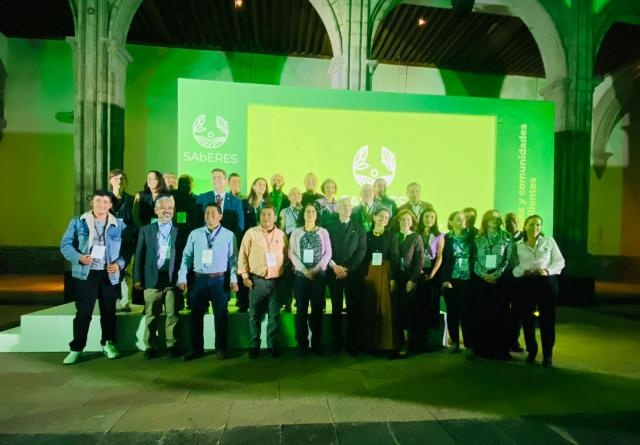This article was originally published here in Spanish.
-
Smallholder farmers make up 72% of the total food production force in Mexico and are responsible for 40% of the national agricultural production. However, they are highly vulnerable to increasingly frequent extreme weather events like hurricanes, droughts, and floods.
-
Working with 50 farmer organizations, the SAbERES project will implement Ecosystem-based Adaptation (EbA) in the agricultural, livestock, beekeeping, and forestry sectors across 300,000 hectares nationwide.
MEXICO CITY, Mexico, July 5th, 2023 - The project Territorial Planning and Financial Innovation to Increase Mexico's Resilience to Climate Change (known as SAbERES in Spanish) officially launched on July 5th, 2023. It aims to improve smallholder farmers’ climate change resilience and adaptation through tailored land use planning policies, Ecosystem-Based Adaptation (EbA) practices, and financing mechanisms.
Although Mexico has a solid institutional framework to reduce its vulnerability and increase resilience to climate change, policy and program implementation is complex. The country faces challenges such as complicated land use planning, large-scale agricultural system degradation, a lack of awareness of the value of biodiversity, and an absence of financial mechanisms that support farmers’ organizations with instruments tailored to their needs.
Smallholder farmers who have less than 5 hectares of land and farmer production systems constitute 72% of Mexico’s food production force; they produce 40% of the national agricultural yield and generate 60% of the country’s contracted employment in the sector (3.3 million people). Despite these numbers, between 2009 and 2022, less than 1% of smallholders in Mexico had access to credit due to the lack of adequate financial mechanisms for this type of production. As a result, they must often depend directly on subsidies.
To address these bottlenecks, SAbERES will help build capacity for local organizations, technical staff at the community level, and smallholder farmers to implement EbA strategies in the agricultural, livestock, beekeeping and forestry sectors. The project will support food security and boost the living conditions and income of small producers, increasing their resilience to climate change.
SAbERES is intended for farmer organizations in the states of Campeche, Chiapas, Hidalgo, Jalisco, Michoacán, Oaxaca, Puebla, Tabasco and Tlaxcala, and will operate in 137 municipalities where high poverty rates, rich biodiversity and climate vulnerability converge. It will help to strengthen the adaptation capacities of ten productive systems: corn, cocoa, coffee, honey, forestry, sustainable livestock, agroforestry crops, ecotourism, non-timber forest products, and agave.
Javier Warman, WRI Mexico’s Director of Natural Resources, said that to improve the living conditions and income of the rural population, they will work directly with farmer organizations to identify land use planning and sustainable food production practices with an EbA approach that can implemented realistically. In addition, he said, the project will provide financial education while also designing a financial mechanism that meets the needs of Mexico’s rural population.
“The financial mechanism developed by the project will serve as a basis to promote sustainable production plans that help other areas adapt to climate change in the future. We expect to promote the value chains that prove to be financially viable among more organizations and rural producers at the national level”, he indicated.
SAbERES also seeks to incorporate youth, women and other marginalized groups from the rural sector in decision-making around land management and agricultural production systems. The project will monitor the involvement of these groups.
Diego Montenegro, a representative of IICA in Mexico, said that the institute will work to improve climate change adaptation and resilience in the rural sector, strengthening land use planning in the context of climate change and EbA criteria. He also highlighted the specific financing mechanism for smallholder farmers that will be created through the project.
“SAbERES will support in establishing state roundtables for political dialogue; the development of a governance framework for land management and improvements in the articulation of territorial and sectoral planning instruments; it will also help to formulate innovative agendas and adaptation plans, implement resilient sustainable production models, and strengthen capacities to improve market access”, Montenegro said.
SAbERES is supported by the International Climate Protection Initiative (IKI) of the German government, in coordination with the Mexican government through its Ministry of Environment and Natural Resources (SEMARNAT). It is promoted by a consortium of organizations comprised of the World Resources Institute Mexico (WRI Mexico), the Inter-American Development Bank (IDB), the International Union for Conservation of Nature (IUCN), the Inter-American Institute for Cooperation on Agriculture (IICA), the Autonomous Group for Environmental Research (GAIA), the International Institute for Applied Systems Analysis (IIASA), the University of Sciences and Arts of Chiapas (UNICACH), and the GITEC-IGIP GmbH consultants group, with the assistance of SEMARNAT and the Mexican Ministry of Agriculture and Rural Development.
Contact
Adriana Alatorre, Press Officer
adriana.alatorre@wri.org
